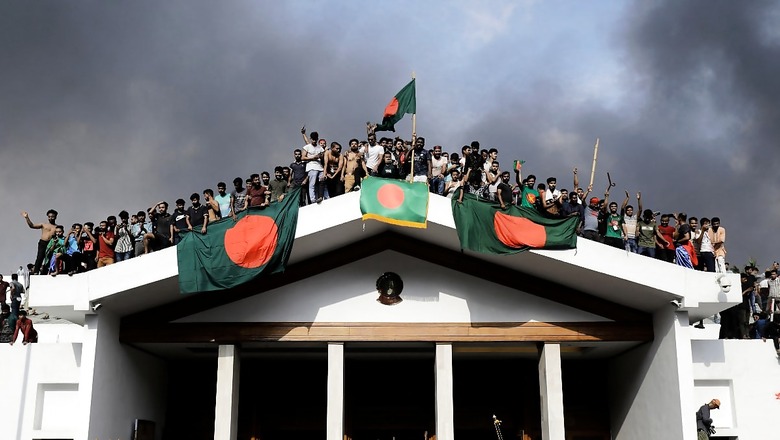
views
The call came well past midnight, India time.
“Dada, please find a way for me to come to India. They will kill me and my family,” said Bangladeshi journalist Mohidul Hassan (name changed to ensure his safety), his voice low and trembling.
Some consider Hassan as close to the toppled regime. His social media handles have been inundated with the vilest of abuse and death threats.
“I am hiding at a friend’s place in Dhaka with my wife and six-year-old son,” he said. “We are awake the whole night. Just a while ago, there was a rampage outside. Houses in this lane were being openly looted. The long beards of Jamaat Shibir were out with long swords, going house to house, emptying out every piece of jewellery, furniture and other belongings. We are lucky this is among the houses they skipped.”
Mohidul is among tens of thousands being violently targeted in Bangladesh. Whether Muslims or minorities, especially Hindus, if you are seen as supportive of the dethroned regime, you are fair game.
But with Jamaat and BNP cadre usurping the student protest, Hindus have become objects of special and egregious level of hatred; one that is reminiscent of the Noakhali genocide.
Bangladesh’s leading English newspaper, The Daily Star, reported on Wednesday that Islamists had attacked Hindus in 27 of the 64 districts already.
In Rayer Kathi, Brahman Kathi, and Baju Kathi areas, for instance, they looted homes, raped and gang-raped women.
In a video, a local Hindu woman says, her eyes tearing up: “They came with swords and sharp weapons. They took everything. To save our daughters, we give them everything we have. I had to hide my daughters.”
Another Hindu woman says: “They came at night. They vandalised our homes and looted everything. We were hiding. They grabbed my brother’s wife, took her to another room, and raped her. When we recovered her, we found her gagged. They even wanted to slit her throat. To save her, we gave them all our gold ornaments.”
In this unending nightmare, what are the lessons for India, a growing global superpower which has been caught completely off-guard, right in its neighbourhood?
Lesson one: Never put all your eggs in one basket
For more than two decades, the Indian establishment-backed Sheikh Hasina. It functioned with a binary: Hasina’s father ‘Bangabandhu’ Sheikh Mujibur Rahman liberated Bangladesh from Pakistan with complete support from India, so that family is above all suspicion; and Khaleda Zia’s family and her party BNP have been pro-Pakistan, so they can’t be trusted ever. With Hasina in the hot seat, India didn’t ever seriously explore a third front, even as her unpopularity grew. This has come to haunt us now.
Lesson two: Never ignore the little neighbour
A rising India, heady with attention and importance from far bigger powers, kept neglecting its smaller neighbours. From intel gathering to diplomacy to propping up effective friendly regimes, a lot was overlooked or taken for granted.
The result is the unravelling of leverage in almost every neighbouring nation from Sri Lanka to the Maldives, Myanmar to Nepal, and now Bangladesh.
In contrast, one needs to learn from how the US constantly works on its smaller neighbours — Cuba to Mexico, Colombia to Venezuela — deploying enormous money and energy.
Lesson three: Never back an unpopular bully
The Indian intelligence and security establishment knew exactly how unpopular the Sheikh Hasina regime was getting, especially since the previous student insurrection in 2018. Yet, it allegedly helped Sheikh Hasina win the 2018 general election by a landslide.
It should have taken into account how Hasina’s unpopularity was rubbing off on India, and Prime Minister Narendra Modi. India should have cut its losses and worked towards an alternative for 2024. It didn’t.
Lesson four: Never hang Hindus, other Indics out to dry
Hinduness is the glue which binds India’s magnificent diversity together as a nation and civilisation. Legislations like the Citizenship Amendment Act (CAA) — steps to turn Bharat into a natural homeland for Indic religions — will remain empty shells as long as the host nation does not take proactive action in every case of persecution of Hindus and those from other Indic religions.
Lesson five: Never ignore local language, culture, trends
Finally, India’s intelligence and security failure in Bangladesh is colossal.
Insiders in the intel community say there was a disconnect with local language and culture at senior levels.
One does not need senior diplomatic staff to have the local language as their mother tongue or understand every nuance of culture. But in Bangladesh, whose mother tongue is one of the major Indian languages, it was possible.
Besides, there are accusations of officials who would fly under the radar using India’s influence to make money, often by even flaunting their nature of work.
Even at top levels of the security establishment, officers with an outdated idea of Bangladesh politics were handling the feedback pipelines.
Bangladesh is perhaps India’s biggest foreign affairs lesson in the last ten years. If it fails to learn from this, there will be dust in the mouth.
Abhijit Majumder is a senior journalist. Views expressed in the above piece are personal and solely those of the author. They do not necessarily reflect News18’s views.



















Comments
0 comment